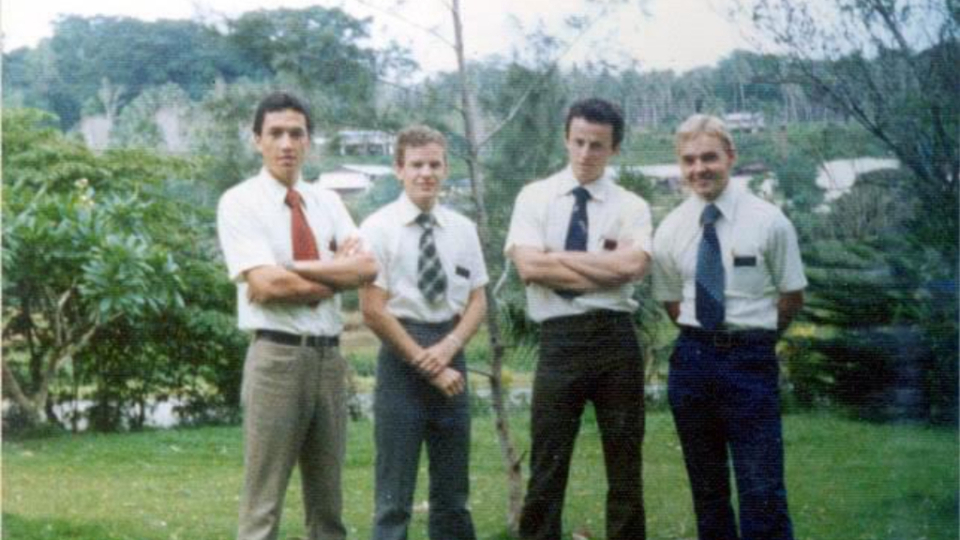
Vanuatu
From left: Mark Strother, Stephen Kenyon, Robert H. Simpson and Dale Hampshire who served in Port Vila, Vanuatu, from 1976 to 1978.2023 by Intellectual Reserve, Inc. All rights reserved.
This story appears here courtesy of TheChurchNews.com. It is not for use by other media.
By Rachel Sterzer Gibson, Church News
Stephen Kenyon, Mark Strother, Robert Simpson and Dale Hampshire first arrived on the New Hebrides islands in the far South Pacific nearly 50 years ago.
In 1976, the young full-time missionaries were about as green in experience as the lush vegetation of the islands where they were called to serve. In those days, there was no missionary training center or language training.
None of the four young men spoke Bislama, the local language. There were no scriptures, manuals or hymn books translated into Bislama. There were no other priesthood holders on the archipelago. And their mission president was nearly 700 miles away in Suva, Fiji.
“It wasn’t always easy,” Kenyon recently recalled about his mission in a social media post on the Church’s Pacific Area Facebook page. “We were driven by our desire to connect with the people we were there to teach.”
From those humble beginnings, however, the Church sprouted, took root and grew. Today, the archipelago — now known as Vanuatu — is home to roughly 11,000 Latter-day Saints in 37 congregations. The nation has its own mission and on April 8 Elder K. Brett Nattress, a General Authority Seventy, broke ground for a temple in Port Vila, the capital city.
Elder Simpson, who now serves as an Area Seventy in Australia, said he was “overjoyed to tears” when President Russell M. Nelson announced a temple for Vanuatu in October 2020 general conference.
The local leader recently returned to his mission to preside at a conference and reminisced with the Saints about the early days of the Church there and rejoiced with them over the forthcoming temple.
“While I was serving my two-year mission here, I promised the Vanuatu Saints if they would continue to be faithful and obey the commandments, one day they would have a temple,” Elder Simpson recalled in an article on the Church’s Pacific Newsroom.
The temple will “shine brightly and stand out as the cleanest and most spectacular building in the area,” Kenyon wrote in his social media post. “People will recognize it and see it as a center of faith. I’m so happy and impressed by the dedication and faith of the people in Vanuatu.”
The Church’s Humble Beginnings in Vanuatu
Vanuatu is made up of roughly 80 tropical islands that stretch across about 800 miles. Its coral reefs, underwater caverns and shipwrecks draw scuba divers from around the world.
According to a nation summary on ChurchofJesusChrist.org, missionary work began there after several Latter-day Saint Tongan families moved there in 1973. In 1975, two Tongan missionaries — Asaeli Mokofisi and Peni Malohifo’ou — became the first official missionaries to be assigned to the archipelago.
They baptized three families, but after Elder Mokofisi and Elder Malohifo’ou were reassigned, official Church services ceased in the country until Elders Kenyon, Strother, Simpson and Hampshire arrived in 1976.
Within two days of their arrival, the missionaries rented a small tin house for Sunday services and tried to track down the families the Tongan missionaries had baptized.
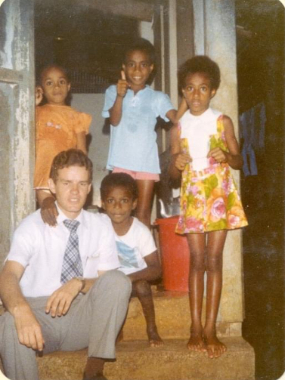
Vanuatu
Young missionary Elder Stephen Kenyon with Vanuatuan Primary children, who helped teach him the local language, Bislama. Elder Kenyon served in Port Villa, Vanuatu, from 1976 to 1978.2023 by Intellectual Reserve, Inc. All rights reserved.In assigning them to the New Hebrides islands, Fiji Suva Mission President Kenneth Palmer organized the quartet into branch leadership: Elder Strother became the branch president; Elder Kenyon was over the Primary; Elder Hampshire served over Young Men/Young Women and Elder Simpson was called to serve over the Relief Society.
And with that, the young elders got to work. In the Church’s Pacific Newsroom article, Strother noted that the four worked well together. They were “all obedient” and they “all loved the humble, friendly people and could feel God’s love for them,” Strother said.
Slowly they began to learn Bislama. “The Primary children were our best teachers,” Kenyon noted.
The elders would translate scriptures and stories as best they could to aid in their teaching.
By the time the four elders completed their missions there were about 70 members regularly attending Church meetings. From there, missionary work ebbed and flowed. Government restrictions on visas made sending missionaries into the country difficult. In 1982, non-native missionaries were expelled from Vanuatu.
What made all the difference were the faithful, pioneer members who shared the gospel with their friends, families and neighbors.
Stalwart Church Members in Vanuatu
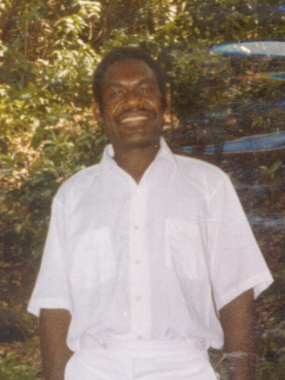
Vanuatu
Jake Taso at his baptism 47 years ago in Port Vila, Vanuatu, circa 1976.2023 by Intellectual Reserve, Inc. All rights reserved.Kenyon recalled teaching Jake Taso, a lay minister and elder from another church. At one point, Taso’s wife fell ill, and he asked the elders to pray for her. Young Elder Kenyon offered to give her a priesthood blessing. They anointed her with oil and blessed her, and she quickly recovered. “[Taso] felt the power in that prayer, and it was a beautiful testament to the power of God in their lives,” Kenyon said. Taso and his family joined the Church, despite being ostracized for it.
The minister-turned-Latter-day Saint was a great missionary who taught the gospel to hundreds of others, Kenyon said. He was one of the first members from Vanuatu to receive ordinances with his family in the Hamilton New Zealand Temple.
Vanuatuan Henry Willy’s wife and children had joined the Church, and he decided to investigate their new religion. When the missionaries showed him a photo of Church President Spencer W. Kimball, Willy instantly recognized him from a vivid dream where he and his family were all dressed in white. “Willy became a wonderful member who shared the gospel of Jesus Christ with others and brought many in,” Strother said.
In October 1998, Tom and Janet Tarohati became the first couple to be called on a mission from Vanuatu and began preaching the gospel in their native land. That same year, seminary and institute classes for religious education were organized.
In 2004, the Book of Mormon was published in the Bislama language. Within 10 years, the country’s first stake was organized — the Port Vila Vanuatu Stake.
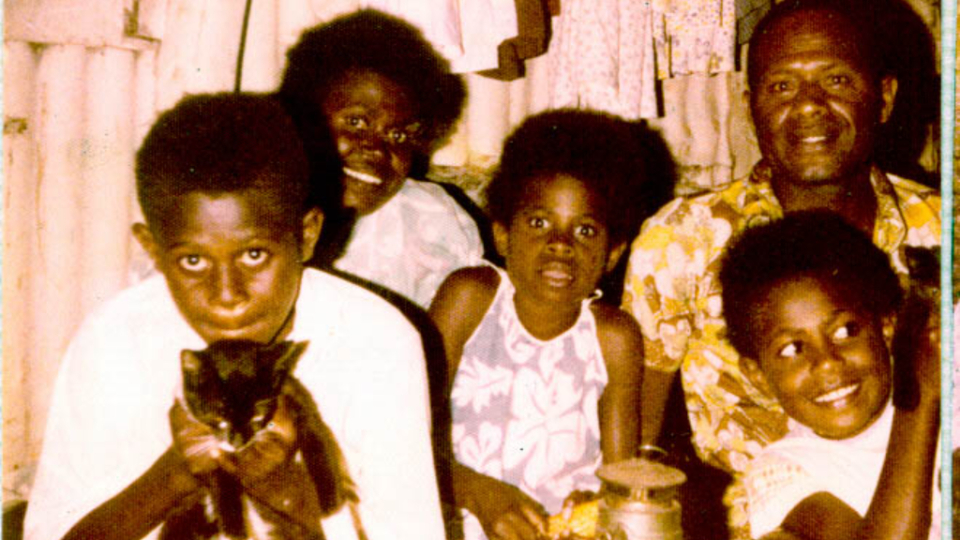
Vanuatu
Henry Willy and his family photographed in Port Vila, Vanuatu, circa 1976.2023 by Intellectual Reserve, Inc. All rights reserved.And now Church members there will have their own temple. “The house of the Lord will not only bless the lives of members, but it will also bless the entire nation,” Elder Simpson said.
Looking back, Kenyon expressed his gratitude for the opportunity to have served as a missionary in Vanuatu. “The memories of the people, their faith, and their love for the gospel will always hold a special place in my heart. It’s incredible to see the growth and progress of the Church in this beautiful island nation.”
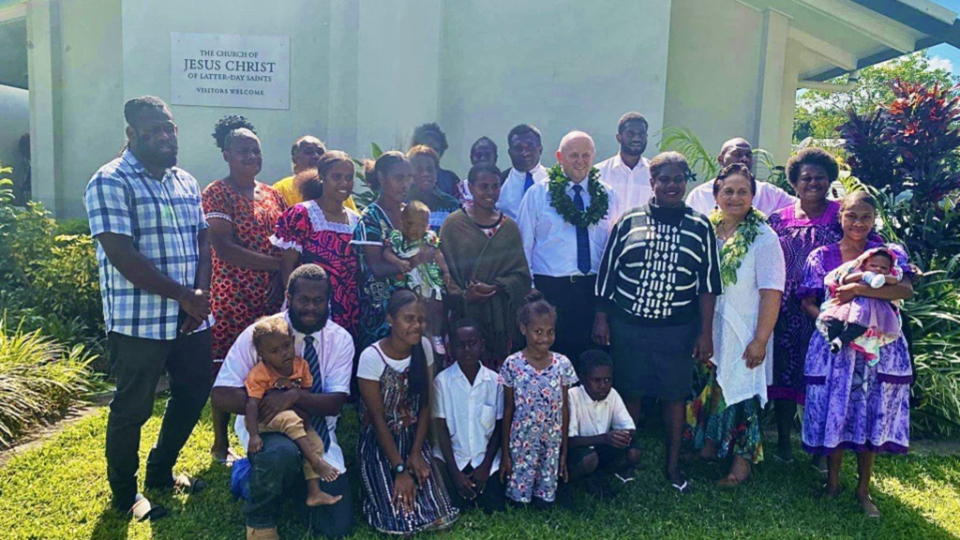
Vanuatu
The Henry Willy family, some of the Church pioneers in Vanuatu, pose for a photo with Elder Robert H. Simpson, an Area Seventy, and his wife, Sister Jinny Simpson, third from the right, during a stake conference in Port Vila, Vanuatu. Elder Simpson taught the family 50 years ago as a young missionary.2023 by Intellectual Reserve, Inc. All rights reserved.Copyright 2023 Deseret News Publishing Company.

